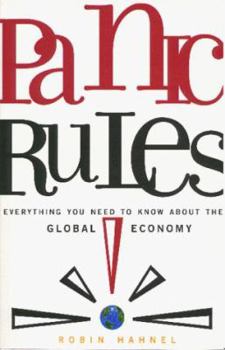Panic Rules!: Everything You Need to Know about the Global Economy
A witty and accessible manual to the global economic crisis. This description may be from another edition of this product.
Format:Paperback
Language:English
ISBN:0896086097
ISBN13:9780896086098
Release Date:October 1999
Publisher:South End Press
Length:125 Pages
Weight:1.85 lbs.
Dimensions:0.3" x 5.4" x 8.5"
Customer Reviews
4 ratings
Fine small book!
Published by Thriftbooks.com User , 18 years ago
I'll be brief - I concur with the other positive reviews. I came across this three or four years ago and I've really remembered it. Having given to a friend, I thought it was important enough to get a replacement copy recently. Another book in the vein is Joseph Stiglitz (Nobel economist), "Globalization and its discontents". Hahnel gives the better job of pointing out WHY some of the discontents happen - like water flowing down hill or balls falling downward through a pinball machine.
Gives a pretty solid understanding of the global economy
Published by Thriftbooks.com User , 23 years ago
Professor Robin Hahnel of the American University in Washington D.C. presents some interesting statistics. He notes that from the early 80's until the Asian economic crises hit in July 1997, much of the world economy was said to be in the midst of an economic "boom" caused by the implementation of neoliberal policies (deregulation, removal of tarrifs and restrictions on capital flows,etc.). Well, according to figures compiled by the Organization for Economic and Commercial Development (OECD), from 1950 to 1973, the year the Bretton Woods system was dismantled and the process of neoliberalization (globalization)began, the average annual gross domestic product per capita of Western European countries was 3.8 percent. From 1973 until 1992, their average annual per capita Gross Domestic product was 1.8 percent. From 1950 until 1973, the average annual per capita gross domestic product in the U.S.A., New Zealand, Australia and Canada was 2.4 percent. From 1973 until 1992 their average annual per capita GDP was 1.4 percent. In Latin America from 1950 to 1973, the average annual per capita GDP was 2.4 percent. From 1973 to 1992 it was .4 percent. The only countries that increased economic efficiency between 1973 and 1992 were the East Asian "tigers" who combined harsh repression of labor, with tax credits and subsidies to export-oriented industries and severe restrictions on inflow and outflow of capital and foreign ownership. Another statistic. He shows that the annual flow of capital around the world has vastly increased by a large margin since the beginning of neoliberalization in the early 70's; he also shows that whereas before that time, capital was largely used for investment and other long term activities, international capital is now largely used for speculative purposes. So he shows very clearly that the Bretton Woods period was far more productive for the world economy than the period since 1973. He notes that in the U.S. wages have been stagnant or declining and that while a relatively large number of Americans own stocks, most of it is concentrated in 401k and other retirement accounts, pretty small stuff and that the wealth from the stocks is overwhelmingly concentrated in the top ten percent of the population. He analyzes what caused the East Asian crises. The East Asian "tigers," under Western pressure, removed restrictions on capital flows, and cut back environmental and labor laws in the late 80's and early 90's and Western capital, mostly speculative, flowed in. Western banks made short term loans to the banks in these countries who made high interest long term loans to export-oriented local businesses. But as one "tiger" deregulated, cut environmental regulations,etc. to compete for Western capital, so did all the others and the boom that many businesses felt was relatively short lived as they faced increasing competition in other countries and were forced to lower prices. They began to have trouble repaying their loans to their loca
Superb treatment of globalization
Published by Thriftbooks.com User , 24 years ago
This is an excellent, easy-to-read, and compelling account of the role international finance played in the Asian Financial Crisis. Hahnel also demonstrates the deficiencies in the IMF response to the crisis. Overall, a superb introduction to globalization, the destructive nature of unregulated capital flows, and the irrationality and instability of the current global economy.
Remarkably comprehensive
Published by Thriftbooks.com User , 25 years ago
In a little more than 100 pages Hahnel does an astonishingly impressive job in setting out global economic theory and its current political situation. This is a very informative work.Hahnel gives us his view of how the global economy works, who benefits from the rules as they currently are, and who loses. He goes on to suggest solutions to what many people perceive as terrible inequality, not only between rich countries and poor countries, but between the wealthy and the not so wealthy across the globe.He spends some time explaining how the current economic order came about, and what's been happening since "globalization" (as we currently understand it) started about 25 years ago. He explains the Asian financial crisis of 1997/98 and shows how it could happen again.This book starts with the supposition that one of the primary concerns of those that are wealthy is figuring out ways to hold on to their wealth and increase it if possible. He does a very lucid job of transitioning from economics to politics and explaining the motivations behind financial and economic political decisions, the effects of which most of us don't understand or see as unimportant.In short this is a wonderful book for figuring out how globalization effects us, why it's important in our everyday lives and what we can do to make it work for us, the people.The most engaging book on economics in years, up-to-date and an eye-opening read





